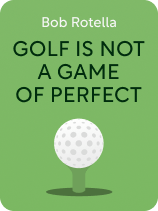

This article is an excerpt from the Shortform book guide to "Golf Is Not a Game of Perfect" by Bob Rotella. Shortform has the world's best summaries and analyses of books you should be reading.
Like this article? Sign up for a free trial here.
How can you boost your confidence in golf? Why is it important to set goals during a game?
Golf Is Not a Game of Perfect by Bob Rotella suggests developing and maintaining confidence in your skills as a golfer. To build confidence, Rotella recommends that you set and commit to lofty goals, work to overcome your fear, and take advantage of selective memory.
Find out how to build your confidence in golf so you can be the best player.
Build Confidence to Make the Most of Your Skill
Once developed, a high level of confidence in golf will enable you to make better decisions and better swings. Confidence helps you avoid second-guessing and fully commit to your choices, thereby improving the quality of your decision-making. Confidence also enables you to think less while swinging and instead rely on the muscle memory and golf skill that you already possess.
(Shortform note: Rotella argues that confidence is a major factor in athletic success. However, there’s still debate on how much confidence impacts performance. Some studies have shown that while confidence improves performance, it’s only by a small amount. Not only this, but the relationship between confidence and performance is understudied in certain demographics, including women and middle-aged athletes.)
1. Set Ambitious Goals and Commit
Rotella argues that the first step in building confidence is setting ambitious goals. When you set an ambitious goal, like winning a tournament, you’re saying that you believe you have what it takes to accomplish your goal. This inner affirmation of your potential helps to establish confidence and can help motivate you to continue to improve.
(Shortform note: While it’s good to set ambitious goals, avoid setting unattainable goals. Unattainable goals are goals that you lack the time, resources, or commitment to actualize. Experts note that setting unattainable goals can lead you to become demoralized when you inevitably fail. This kind of failure can stunt your confidence, leading you to perform poorly.)
Once you’ve set your ambitious goals, commit yourself to a program of improvement. What this program looks like depends on your goals and your schedule. If you’re a professional athlete with no other major commitments, it might make sense to commit 40+ hours a week to improving your game. However, if you’re an amateur golfer with other commitments, you might only be able to devote a few hours to practice each week.
(Shortform note: As you set up your practice schedule, consider committing to multiple short practice sessions a week. Research shows that due to the limits of your attention span, you learn more efficiently in multiple short sessions than in a single long session. To take advantage of this phenomenon, consider committing 30 minutes or an hour to golf each day instead of, for instance, practicing for four hours once per week.)
Regardless of how much time you’re able to devote to golf, focus on nothing but golf for the duration of your allotted practice time. It can be tempting to take a break from practice to scroll social media or answer emails, but allowing yourself to become distracted robs you of your practice time and can reduce your motivation.
(Shortform note: In Deep Work, Cal Newport argues that to deeply focus on a task you need to create an environment that’s free of distractions. This can be difficult in golf because you’re unlikely to find an environment with no distractions. However, there are steps you can take to minimize distractions while practicing golf. For instance, you can try to move away from areas of the range where golfers are socializing or let others know that you won’t be available for work calls or emails while you’re practicing.)
2. Overcoming Fear
Once you’ve set your goals and committed yourself to working toward them, the next step in building confidence is overcoming fear. You must learn to overcome the fear of hitting bad shots and playing bad rounds because such fear can have a disastrous effect on your golf game. According to Rotella, fear disrupts your muscle memory, leading you to hit bad shots. In response to hitting these bad shots, your fear deepens, leading you to hit even more bad shots, and launching a vicious cycle that can ruin a round of golf.
Rotella notes that fear is distinct from nervous excitement. While fear is a mental struggle, nervous excitement refers to your body’s natural response to stressful situations. When you enter these situations, your body increases your heart rate and releases adrenaline in preparation for you to exert yourself. In some cases, the physical characteristics of nervous excitement can actually improve your game.
To avoid succumbing to fear during your rounds, Rotella recommends focusing on the processes of playing and improving and not the results of individual shots and rounds. When you’re focused too narrowly on the results of your shots, bad shots and round scores feel exceptionally demoralizing. However, when you zoom out and focus on your overall commitment to improving your game, bad shots will feel less significant and less painful when considered in the context of your overall upward trajectory.
For many golfers, the pressure of competing against others can be a source of fear and anxiety. The fear of being outperformed by a competitor can make it difficult to play well. The key to mitigating fear of competition is, once again, focusing on process and not results. Rotella notes that while your opponents in the context of a single round are the other golfers, in the long term, you compete against yourself.
3. Focus On Positive Memories to Build Confidence
As you continue building your confidence, choose to remember positive golf experiences while ignoring negative ones. Rotella argues that by remembering your best shots as you play and practice, you’ll be able to relax and play better, which in turn bolsters your confidence. Just as remembering good shots can help you play better, remembering bad shots can inspire fear, distract you, and lead you to play worse.
To take advantage of this phenomenon, take a moment to appreciate your good shots and attempt to commit them to memory. By the same token, move on quickly from bad shots, making use of Rotella’s strategies for responding to adversity–lowering expectations, laughing things off, and striving to enjoy the game.
(Shortform note: If you struggle to recall your best shots and biggest achievements in golf, it could help to create a list of them. Experts argue that listing your successes can help boost self-worth and performance. Having a list to refer to is helpful when you’re having trouble remembering positive experiences in the moment—just be sure you add to the list each time you hit a great shot or finish with a great score.)
Rotella notes that some clients have been confused by his advice regarding memory. Clients pointed out that by ignoring their bad shots while focusing on the good, they’d build confidence based on inaccurate information. However, according to Rotella, it doesn’t matter that selective memory is inaccurate because the point is to build confidence and play better, not to accurately remember previous rounds of golf.
Use Confidence to Access Intuition
According to Rotella, when you’ve built up your confidence, you’ll be able to use your intuition to make strong decisions in the game. Intuition refers to your mind’s ability to tap into your reservoir of skill and golf experience and use that information to rapidly determine the best course of action in a given situation. Your intuition presents you with your initial idea about how to approach a shot, and conscious re-evaluation of the situation produces second and third guesses.
(Shortform note: While Rotella contends that relying on intuition enables you to make the best possible decisions, some authors argue that intuition isn’t so reliable. Experts note that the brain’s tendency to sort things into patterns sometimes leads it to produce faulty judgments. In other words, when you receive new information, your brain will try to match that information up with a pattern it already knows, even if the match isn’t completely accurate.)
When you’re playing with confidence, it’s easier to believe that your initial, intuitive plan for each shot is the best. As Rotella argues, this is usually the case, and by confidently following your intuition, you’ll choose better shots and shoot lower scores. However, when your confidence is low, your lack of belief in yourself can lead you to second-guess your plan for how to approach a shot. When you second-guess, you may end up choosing a weaker plan for your next shot. If you choose many suboptimal shots throughout the round, your score may increase by several strokes.
For example, imagine that you hit into a deep bunker just off the green. Based on your instincts, your first thought is to shoot straight for the hole, as you’re pretty confident in your sand wedge. However, as you prepare to hit the shot, your confidence falters, and you consider aiming for the front of the green to avoid accidentally overhitting the ball and rolling off the back of the green. After some waffling, you elect to shoot for the front of the green. During your swing, your uncertainty about the plan distracts you, causing you to hit a weak shot that doesn’t make it out of the bunker. If you had been confident enough to play intuitively, you would have shot for the hole, and even if you missed, you’d probably have at least gotten out of the bunker. Instead, lacking confidence, you chose a shot that cost you at least one stroke.
(Shortform note: Rotella’s assertion that you should go with your first, intuitive idea for each shot is backed up by some scientific research. When asked to predict uncertain future events, people were generally most accurate on their first guess. Not only this, but the longer participants took to revise their estimates, the more inaccurate their predictions were, suggesting that the more time you spend thinking, the more your decision-making suffers.)

———End of Preview———
Like what you just read? Read the rest of the world's best book summary and analysis of Bob Rotella's "Golf Is Not a Game of Perfect" at Shortform.
Here's what you'll find in our full Golf Is Not a Game of Perfect summary:
- A framework for improving the mental side of your gold game
- Why thoughts, confidence, and strategy are more important than your swing
- Techniques for choosing the right thoughts, goals, and shots






